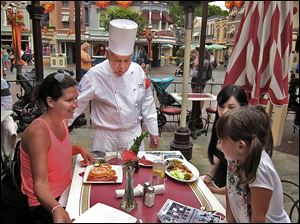
DISNEYLAND’S MR. LONGEVITY
Not happy with work? Wait till you’re 50 or so
Older employees satisfied with job, benefits
10/27/2013
Oscar Martinez, 77, center, greets diners at the Carnation Cafe at Disneyland in Anaheim, Calif. The chef is the park’s longest-tenured employee at 57 years.
ANAHEIM, Calif. — Not happy with your job? Just wait.
A study by the Associated Press-NORC Center for Public Affairs Research finds that 9 in 10 workers who are age 50 or older say they are very or somewhat satisfied with their job.
Older workers reported satisfaction regardless of gender, race, educational level, political ideology, and income level.
Consider Oscar Martinez.
If Disneyland truly is the happiest place on earth, Mr. Martinez may be one of its happiest workers.
Never mind that at 77, the chef already has done a lifetime of work. Or that he must wake up around 3 a.m. each day to catch a city bus in time for breakfast crowds at Carnation Cafe, one of the park’s restaurants.
With 57 years under his apron, he is Disneyland’s longest-serving employee.
“To me, when I work, I’m happy,” said Mr. Martinez, who’s not sure he ever wants to retire.
Though research has shown people across age groups are more likely to report job satisfaction than dissatisfaction, older workers consistently have expressed more happiness with their work than younger people have.
The AP-NORC survey found significant minorities of people reporting unwelcome comments at work about their age, being passed over for raises and promotions, and other negative incidents related to being older.
But it was far more common to note the positive impact of their age.
Six in 10 said colleagues turned to them for advice more often and more than 4 in 10 said they felt they were receiving more respect at work.
Older workers generally have climbed the career ladder, increased their salaries, and reached positions where they have greater security, so more satisfaction makes sense, said Tom Smith, director of the General Social Survey, one of the most comprehensive polls of American attitudes.
“It increases with age,” said Mr. Smith, whose biannual survey is conducted by NORC at the University of Chicago. “The older you are, the more of all these job-related benefits you’re going to have.”
Looking at the 40-year history of the GSS, the share of people saying they are very or moderately satisfied with their jobs rises steadily with each ascending age group, from just above 80 percent for those under 30 to about 92 percent for those 65 and older.
But as in the AP-NORC survey, the age gap grows among those who derive the greatest satisfaction from their work, as 38 percent of young adults express deep satisfaction compared with 63 percent age 65 and up.
Mr. Smith said earlier in life, people are uncertain what career path they want to take and may be stuck in jobs they despise. Though some older workers stay on the job out of economic necessity, many others keep working because they genuinely like their jobs.
Eileen Sievert of Minneapolis, a French literature professor at the University of Minnesota, used to think she would be retired by 65. But she’s 70 and loves her work so much, it became hard to leave. She instead works fewer hours in a phased-retirement program.
Robert Schuffler, 96, still works most days at the fish market he opened in Chicago decades ago.
He has turned over ownership to a longtime employee, but he can’t imagine not seeing the customers he has known so long, and who still show up with a warm smile, a kiss for Mr. Shuffler, and a shopping list.